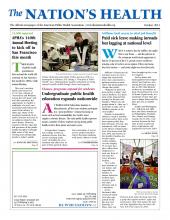Despite efforts aimed at reducing the problem of errors linked to medication, a recent study found about one in five prescriptions among the elderly is inappropriate.
Published Aug. 22 in the journal Public Library of Science One, the study was based on a review of English language studies of medication use in the elderly. It found the median rate of inappropriate prescriptions was 20 percent. Some medications with the highest rates of inappropriate use were the antihistamine diphenhydramine, the antidepressant amitriptyline and the pain reliever propoxyphene.
The study’s authors said those medications, marketed under such brand names as Benadryl, Laroxyl, Endep and Darvon, are “good candidates for being targeted for improvement” by methods such as computerized medication records accessed by all patients’ doctors.
Problems with prescription drugs including drug interactions are an ongoing concern among elderly patients, with previous studies showing up to 35 percent of elderly outpatients with chronic health conditions suffering from “preventable adverse drug events,” the study noted.
The inappropriate use of prescription drugs has been described as underprescribing, misprescribing or overprescribing. For the study, inappropriate medication prescription was defined either as a medication that introduces a risk of an adverse drug event when evidence exists for an equally or even more effective medication or the “failure to achieve the optimal quality medication use.”
The study examined prescription drug use among primary care patients older than 65 and found that the overall prevalence of inappropriate prescriptions varied widely, from about 3 percent to as high as nearly 39 percent.
“Several factors may contribute to this variation,” the study’s authors wrote. “Different countries use different sets of medications due to registration issues. There is, hence, no universal list of medications and criteria for assessing the overall medication use by older patients.”
The study also found that even within the United States, the rate of inappropriate prescriptions varied significantly, suggesting “some systematic differences between practices may exist.” Some factors that influence prescription drug choice include cost and the way medications are purchased within a health system.
In the study, researchers analyzed inappropriate prescriptions for eight classes of medication, including sedatives, muscle relaxants, high blood pressure medication and drugs used to treat heart conditions. Of particular concern, the study’s authors said, are those medications already considered at high risk for complications or drug interactions, such as muscle relaxants, antidepressants and some drugs prescribed to prevent blood clotting.
One way to address the problem of inappropriate medication prescribing for elderly primary care patients would be to employ clinical decision support systems, the study’s authors said. Such systems can give computerized alerts to physicians if a medication could pose a risk to a patient because of multiple health problems or possible drug interactions.
“Good alert design which focuses on the relevant information to the physician can improve the effectiveness of these systems,” the study’s authors said.
They also recommended future studies that would examine treatment goals and medication choice among physicians.
“Despite intensified efforts to scrutinize and improve the quality of medication prescription among elderly persons in the primary care setting, inappropriate medication prescriptions are still common,” the study’s authors wrote. “Focused and systematic interventions are needed to improve the quality of medication prescription in this patient group.”
The study is online at http://www.plosone.org/article/info%3Adoi%2F10.1371%2Fjournal.pone.0043617
- Copyright The Nation’s Health, American Public Health Association









